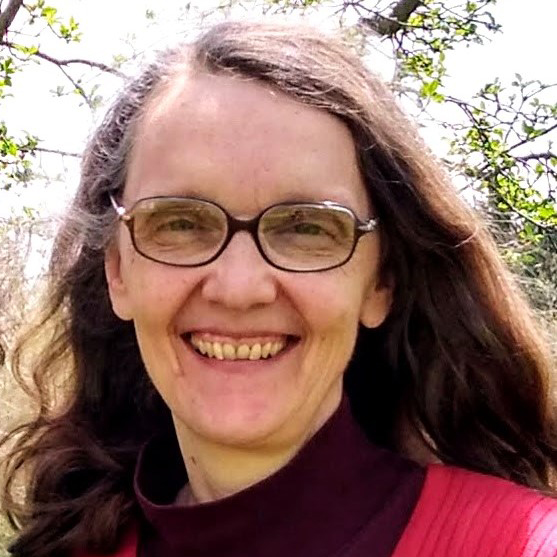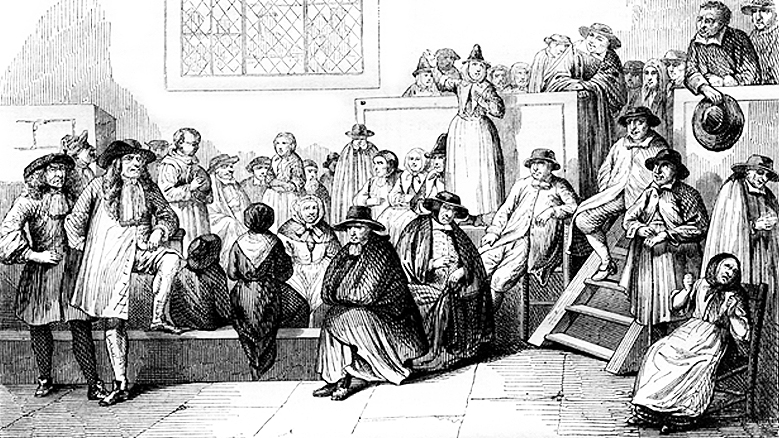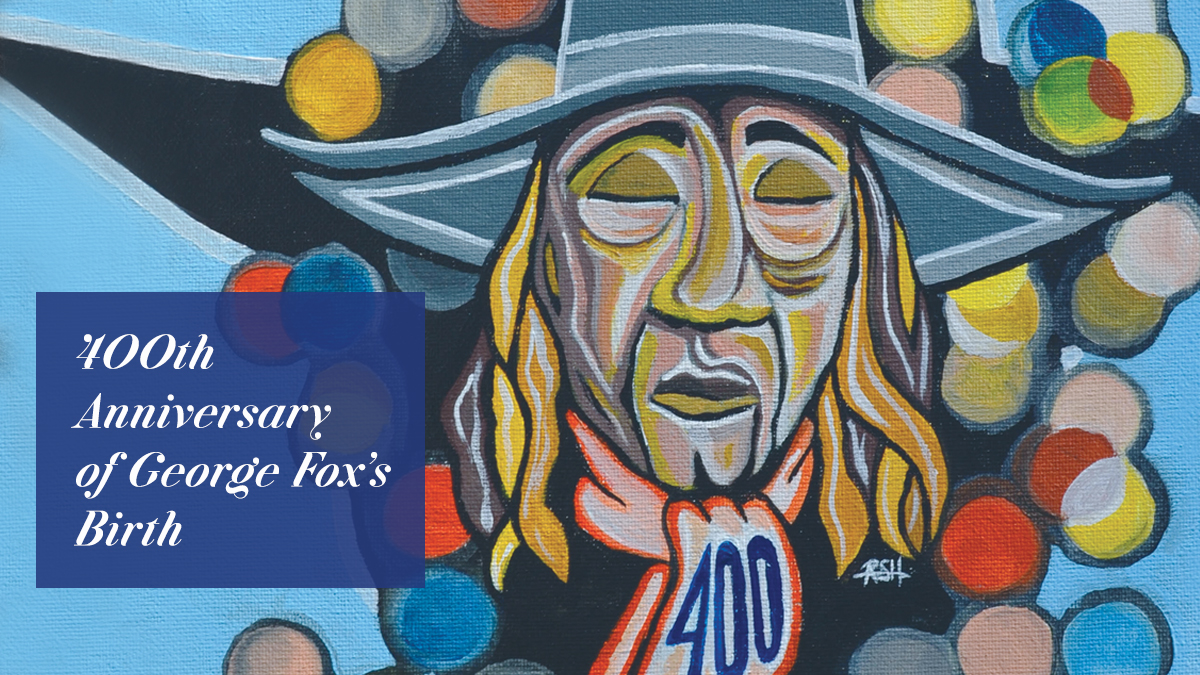Many Liberal Friends today will readily assert that there is “that of God in everyone,” a phrase used by George Fox a few times in his Journal. It is rare, however, to hear these Friends use a phrase that Fox employed much more often: “The Power of the Lord was over all.” It is my impression that many among us believe that the Light, the divine nature within human beings, is all there is “of God,” or at least all we can know. Rather than experiencing the power of God both within human beings and also outside of us, permeating everything, we have subtly put our focus on humanity as the locus of divinity and removed God from the center of our being, our faith, and all of Creation. And further, Liberal Friends have ceased to emphasize an understanding that was fundamental to early Quakers: that the divine nature within a human being requires cultivation in order to grow to maturity.
The spiritual discoveries and direct experiences of the first Quakers were so radical that their fellow Christians called them blasphemers and heretics. Many Friends were imprisoned for public actions, but it was the written or spoken words of Quakers that were most challenging. Their powerful experiences of spiritual realities and their beliefs about the inward Divine Presence contrasted with the accepted religious hierarchy, dogma, and rituals of the time.
Some of the so-called heretical spiritual beliefs of the first Quakers are still challenging to many groups and societies, but these beliefs are considered to be commonplace truths by many others in our day. As a religious society today, we lack a great deal of the spiritual power known by Friends at the beginning of the Quaker movement. This is not surprising. Most spiritual movements begin with a burst of new insights and energetic enthusiasm that is gradually dimmed as the movement becomes organized into an institution and perpetuated over the generations by many who never directly experience the spiritual reality that the movement was created to share.
Friends owe a debt of gratitude to those who tamed the original theology of the first Friends and organized the Quaker community into the structures they called “gospel order.” If they had not done so, the Quaker tradition would not have survived to be passed down.
The first Quakers were farmers and artisans. As the movement expanded from its birthplace in the rural north of England and grew in popularity in England’s largest cities, it drew some wealthy, highly educated adherents, and the way it presented itself began to change. In Heaven on Earth, Douglas Gwyn describes a shift that took place within 20 years after the beginning of the movement. Having suffered terribly from persecution and imprisonments, few of the initial leaders were still alive. George Fox and Margaret Fell remained, however, and they worked with the second generation of Friends to bring the apocalyptic early Quaker movement into an organized religious society that would endure after the restoration of England’s monarchy. Gwyn explains how they changed their behavior:
Friends struck something of a “deal” with an arrogant, alienated regime. In the face of an establishment that continued to scapegoat nonconformist groups even through the 1680s, Friends strove to represent themselves as “harmless” and “innocent.” They had been pacifist all along, but they had also threatened the entire social order. Now they sought to make themselves as inoffensive as possible, while still maintaining their own standards.
In 1689, as a result of these efforts, Friends were granted legal toleration.
Those of us who have a taste for what was lost in the process mourn that some of the most radical insights of Quakerism did not survive that period’s accommodation to society. However, Gwyn reminds us that Friends owe a debt of gratitude to those who tamed the original theology of the first Friends and organized the Quaker community into the structures they called “gospel order.” If they had not done so, the Quaker tradition would not have survived to be passed down.
In the process of working for toleration of Quakerism, two of the best seminary-educated theological writers of the second generation of Friends, Robert Barclay and William Penn, were eager to demonstrate that Quakerism was theologically consistent with Scripture. Barclay’s brilliant An Apology for the True Christian Divinity, which became the standard Quaker book of theology for centuries to follow, organized its 15 propositions in the same format as the Puritan’s Westminster Shorter Catechism. In this and other subtle ways, it structured Quakerism as the most radical expression of Puritanism, rather than as something different and more revolutionary. In the process, some of the most radical ideas and experiences expressed at the beginning of Quakerism by George Fox were modified or suppressed. This was not a betrayal of Fox, who was a mentor to both Barclay and Penn. In his own writing of the time, Fox himself began to recast Quakerism in a more conventional way. In our challenging era, however, we need to draw from the full radical revelation received by the first Quakers.
The earliest Friends, who had just lived through the English Civil War, believed they lived in apocalyptic times: a period in which one world was ending and another was beginning, a time of great revelation. They proclaimed a new beginning, and the birth of a new humanity. For centuries, certain people and groups across Europe and England had sensed that God was preparing to reveal a new spiritual “dispensation” to humanity. The earliest Quakers believed they had received this new dispensation. Like the first Christians, Quakers pointed to many Scripture passages predicting this new relationship between God and human beings. They had received, for example, the pouring down of God’s Spirit on all flesh, female as well as male, predicted in Joel 2:28, and they proclaimed they had been given the power of prophecy. Another Scripture passage important to early Friends was Romans 8:14: “For all who are led by the Spirit of God are children of God” (NRSV).

in 1660. Photo by Nuttytimmy on Wikimedia Commons.
A key revelation received by Fox is that Christ is present within, as an inward Light and teacher. Everyone has the capacity to be taught directly by this same Light, “which lighteth every man that comes into the world” (John 1:9 [KJV]). Fox emphasized that a measure of the Light of Christ is present like a tiny seed within each person, needing careful attention and cultivation. In most souls, the seed is choked or covered over. And there is another seed, from an unholy source, that competes with the Light to grow and dominate inside each person. As he looked within his own mind and heart, Fox was pained to discover impulses toward the very behaviors he condemned in others. Seeing this, he submitted to an intense internal process. He allowed himself to see the hidden ways he inwardly resisted God. As he acknowledged what was revealed, the Light began to reveal how to open himself to the Divine Spirit. He compared the process to the refiner’s fire: in the blaze of the inner Light, the baser instincts and tendencies within him were being revealed and gradually burned away.
Early Friends pointed to Scripture passages that tell that the human being was created in the image and likeness of God, with a pure nature. Like other Christians, they believed that the disobedience of Adam and Eve plunged humanity into a “fallen” nature. By means of the purification of the refiner’s fire, however, the fallen human being is reborn in the Spirit, and the human soul is restored to its original divine nature. In Proposition VII of his Apology, Robert Barclay speaks of a two-part process of redemption, the first part being a pure gift and the second requiring “witness,” which perhaps can be interpreted as faithful action in response to the leadings of the Spirit. This process of redemption, Barclay says, results in “unity, favour, and friendship with God.”
By 1648, Fox was coming fully into his prophetic powers. In that year he had a powerful inward experience, described in his Journal. In a vision, he was taken up into the Paradise of God and into the condition of Adam and Eve before their disobedience, the original human state of walking daily with God and receiving and heeding Divine Guidance. In this state, Fox was able to see into all creatures, and the “divine Word of wisdom and power by which they were made” was revealed.
Then he was immediately taken up to “see into another or more steadfast state than Adam’s in innocency, even into a state in Christ Jesus, that should never fall.” In this divine revelation, Fox experienced an invisible unity, a oneness that underlies the diversity and apparent separateness of people and things, uniting all in God. He wrote that this fundamental oneness would eventually be revealed to each person who sufficiently surrenders to God:
as people come into subjection to the Spirit of God, and grow up in the image and power of the Almighty, they may receive the Word of wisdom, that opens all things, and come to know the hidden unity in the Eternal Being.
This visionary experience was the culmination of a long process in which the Light had revealed his sins and temptations, refined him, and illuminated him with spiritual truth. Those who submit patiently to this process eventually become completely willing and able to live in harmony with God’s will. Fox pointed out to critics that to say attaining such a state is impossible—as was commonly proclaimed in his day—is to claim that sin is more powerful than the transforming power of God or Christ. In proclaiming the possibility of being restored to the original state in which humanity had been created, in the image and likeness of God, with a perfect, divine nature, early Quaker writers made reference to 2 Peter 1:4 (RSV): “[H]e has granted to us his precious and very great promises, that through these you may escape from the corruption that is in the world . . . and become partakers of the divine nature.”
As Friends grew in unity with God, abiding in God’s power and love through the work of the Light within, they became vessels through whom divine healing and transforming love flows toward others. One day, after undergoing years of seeking and inward transformation, Fox was walking in the fields and heard God speak to him and confirm that he had been born anew: “the Lord said unto me, ‘Thy name is written in the Lamb’s book of life, which was before the foundation of the world’; and as the Lord spoke it I believed, and saw in it the new birth.”
Before his visionary experience of the Paradise of God, only a few people and groups had heeded the message of George Fox. After his rebirth as a son of God, Fox’s prophetic abilities grew in power and fullness. Speaking boldly in steeplehouses, market squares, and other public places, he caused an uproar as he proclaimed the radical truth that had been made known to him. In his Journal, he wrote:
the Lord commanded me to go abroad into the world, which was like a briery, thorny wilderness, and when I came in the Lord’s mighty power with the word of life into the world, the world swelled and made noise like the great raging waves of the sea. . . . Now I was sent to turn people from darkness to the light, that they might receive Christ Jesus, for to as many as should receive him in his light, I saw that he would give power to become the sons of God, which I had obtained by receiving Christ.
It is helpful to recover all the radical revelations received by George Fox and the first Friends, and in opening to receive continuing revelation in our time, we must not limit ourselves to those revelations but be prepared to be faithful to whatever hidden truths will be revealed.
Fox was put on trial several times for blasphemy and heresy. He was convicted at Derby jail in 1650 and spent long months in prison, where many curious people came to visit and question him. An ardent seeker in York, Richard Farnsworth, began a correspondence. After leaving prison, Fox traveled to York to meet Farnsworth. There Farnsworth and many other seekers joined in spreading his message. Following the guidance of the Light, Fox and his new friends traveled further north to Westmoreland, where groups of seekers had been gathering for years, waiting for God to send them prophetic guidance. In 1652, a great number of them became convinced Quakers.
In that same year, 40 local ministers in Lancaster County brought a case against Fox, accusing him of blasphemy. Judge Thomas Fell, whose wife, Margaret, had become a Quaker, was one of three presiding judges. Colonel West, a close friend of the Fell family, was another. In his 1992 book New Light on George Fox and Early Quakerism, scholar Richard Bailey quotes from the transcript of the trial. The blasphemy charge was being leveled against Fox by the ministers because one of them had heard Fox say, “He that sanctifieth and [they] that are sanctified are all of one in the father and the son and that you are the sons of God.”
During the trial, Judge Fell required the other judges to look carefully at the law. According to the blasphemy laws, it was illegal to claim equality with God. After an exchange on the subject, Judge Fell declared that Fox had not claimed to be equal to God but to be united with God. To be compared, two things must be distinct, separate from each other.
Charles Marshall, leader of the 40 ministers who had brought the accusation, questioned Fox: “Art thou equal with God?” “My Father and I are one,” Fox said.
Marshall declared that Fox’s statements should be found to be against the blasphemy laws. Colonel West replied that the task of the judges was to decide the case according to the law as it was written. Fox had claimed oneness with God, but he had not claimed equality with God. Therefore, Fox had not broken the law. The ruling at the Lancaster trial established an important precedent that protected the Quaker movement at subsequent blasphemy trials. However, in the theologies of Friends written by the second generation, though the state of unity with God is lifted up as possible, Fox’s revelation of a hidden oneness with God does not appear.
In this time of a rapidly changing climate, there is pressure on all social systems. Humanity is facing a future more apocalyptic than the English Civil War out of which Quakerism was born. To meet the changes ahead of us with all the divine wisdom, love, and spiritual force available to us, we need to put God—however we conceive of the Eternal Being with which we are one—back at the center of our hearts, minds, worship, and community life. We need to reintegrate the most radical insights and practices of the first Quakers and learn to submit to the inward Light that can guide us, so that we, too, can be restored into the divine nature and participate in the best possible way in the healing and truth-telling work of God in this unprecedented time. It is helpful to recover all the radical revelations received by George Fox and the first Friends, and in opening to receive continuing revelation in our time, we must not limit ourselves to those revelations but be prepared to be faithful to whatever hidden truths will be revealed.








Wow! What a bracing reminder of where we Quakers came from. I feel
like a flashlight with a weak battery compared with your description of
the blowtorch faith of early Friends. Thank you, Marcelle.
Thank you, Signe! I find a lot of inspiration in the first generation of Quakers.
No coincidence God inspired the equality of Jesus in the heart of an autocratic global superpower soon after the printing press, sharing the wisdom with the US, and beginning the end of nepotistic monarchy. Unfortunately, we still have global unilateral executives in our winner-take-all systems that exclude everyone else (non-billionaires). Sustainable peace requires the equality of patient listening consensus for spiritual unity. The US is presently the global superpower at the dawn of the internet, and we need to learn to share executive power with multiple parties, ideally based on core Quaker ideals and testimonies like SPICES, to minimize political parties dividing us by uncontrollable factors like gender, race, age, disability, etc. The best way forward is to start with our many churches in the US, which should best understand the need to reform the exclusionary force of majority rules using the equality of Jesus via consensus for spiritual unity. If we choose to listen and learn from God (not hierarchical submit) we may be allowed to remain influential in our world.
Thanks so much Marcelle Martin for this wonderful insights. Indeed is being driven as Quakerism currently has lost so much connection from the first generation of Quakers. Just how George Fox was calling people to Christ Jesus is . That boldness of spreading the good news of Christ Jesus seems to have faded away.
Hi Marcelle! I enjoyed diving into your exploration of Quaker history as accompanied by divine guidance, and I also love being nudged in faithfulness groups by your helping hand on that topic. However, in starting this article with pinning Liberal Friends as a singular entity, and saying “…Liberal Friends have ceased to emphasize an understanding that was fundamental to early Quakers: that the divine nature within a human being requires cultivation in order to grow to maturity,” I felt there was a missed opportunity for bringing together our varied theological perspectives within Quakerism into the balm of oneness that our openness holds space for. If there was only a sense of humanity being all we needed, why would Quakerism and Quaker worship still hold such power and unfold so many of us into relationship with Spirit and living a life guided by Spirit? As someone who didn’t used to be able to use the word God, let alone have a vulnerable conversation about God and spiritual life with someone who exuded judgment with certain language, Liberal Quakerism brought into my internal conversation such a variety of perspectives as to allow me to let go of past constrictions. The beauty of God for me is in openness and enoughness, not in judgment, and only through finding that in my cultivation am I able to be here today reading your words and writing mine. Thank you again for your exploration of this!
Thank you, Mia. This is a helpful perspective!
Blessings,
Marcelle